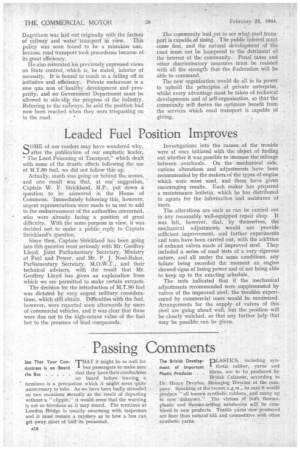Leaded Fuel Position Improves
Page 16

If you've noticed an error in this article please click here to report it so we can fix it.
SOME of our readers may have wondered why, after the publication of our emphatic leader, "The Lead Poisoning of TranSport," which dealt with some of the drastic effects following the use of M.T.80 fuel, we did not follow this up.
Actually, much was going on behind the scenes, and one result was that, at our' suggestion, Captain W. F. Strickland, M.P., put down a question to be answered in the House of Commons. Immediately following this, however, urgent representations were made to us not to add to the embarrassment of the authorities concerned, who were already facing a position of great difficulty. With the same purpose in view, it was decided not to make a publicreply to Captain Strickland's question.
Since then, Captain Strickland has been going into this question most seriously with Mr. Geoffrey Lloyd, Joint Parliamentary Secretary, Ministry of Fuel and Power, and Mr. P. J. Noel-Baker, Parliamentary Secretary, M.O.W.T., and their technical advisers, with the result that Mr. Geoffrey Lloyd has given an explanation from which we are permitted to make certain extracts.
The decision far the introduction of M.T.80 fuel was dictated by very cogent military considerations, which still obtain. Difficulties with the fuel, however, were reported soon afterwards by users of commercial vehicles-, and it was clear that these were due not to the high-octane value of the• fuel but to the presence of lead compounds. Investigations into the causes of the trouble were at once initiated with the object of finding out whether it was possible to increase the mileage between overhauls. On the mechanical side, various alterations and adjustments have been recommended by the makers of the types of engine which were most used, and these have given encouraging results. Each maker has prepared a maintenance bulletin, which he has distributed to agents for the information and assistance of users.
The alterations are such as can be carried out in any reasonably well-equipped repair shop. It was felt, however, that, by themselves, the mechanical adjustments would not provide sufficient improvement, and further experiments and tests have been carried out, with the addition o-f exhaust valves made of improved steel, They included a series of road tests of a very, rigorous nature, and all under the same conditions, any failure being recorded the moment an engine showed signs of losing power and of not being able to keep up to the exacting schedule.
The tests indicated that if the mechanical adjustments recommended were supplemented by valves of the improved steel, the troubles experienced by commercial users would be minimized. Arrangements for the supply of valves of this steel are going ahead well, but the positionwill be closely watched, so that any further help that may be possible can be given.




















































